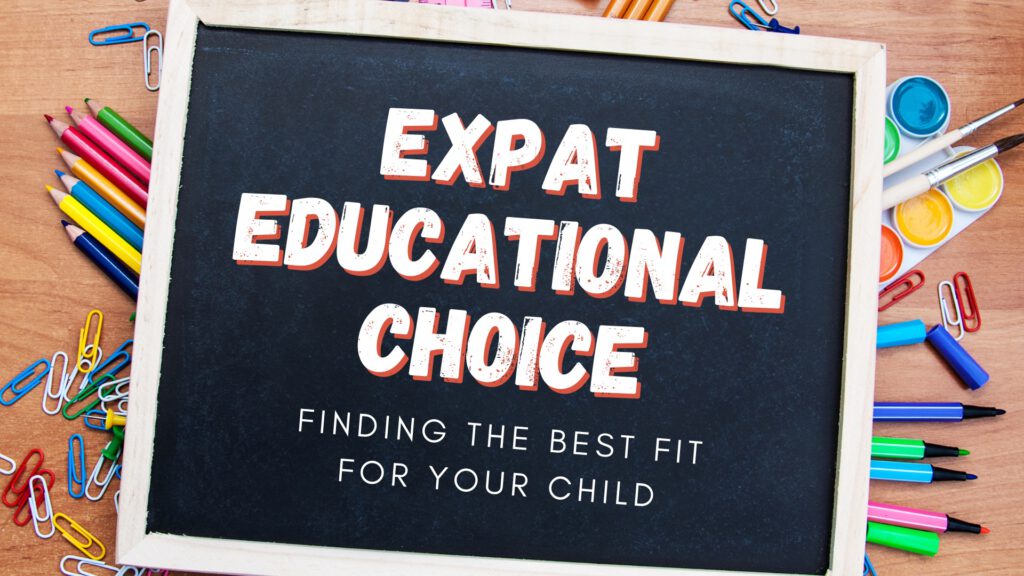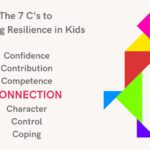Choosing a New School

Table of Contents
Choosing a New School - Educational Considerations
Choosing a school (dare I say choosing the “best” school?!) for your children can be the penultimate stress-factor during an international move. From different school systems and curriculums to new languages, transport & logistical arrangements to classroom organization – there are many, many things to take into consideration – perhaps even considering different schools for each of your children.
To give some insight into this subject and provide a starting point for parents getting ready to move their family, I turned to an expert. Alicia Giblett has taught at international schools around the world and is as passionate about caring for Third Culture Kids and helping them transition between different schools and lifestyles as any one I know.
Hello Expat Parents!
As an international school educator who has spent over a decade abroad, working in six international schools in four countries – I’m writing today to provide you with a list of factors to consider when looking into educational options for your child(ren) as you prepare to move.
Each family will have a different situation and will prioritize different things based on their needs. I hope that this blog post will help to guide you in your search for your family’s best fit. This list is a starting point and under each title I will give you a bit of information and options to consider.
–Alicia
INTERNATIONAL vs. LOCAL SCHOOL
If you are wanting to explore the in-person educational options in your new city – there are likely two big categories: the international school(s) or the local education system.
International Schools are more likely to align with previous curriculums, teaching/learning styles and have a student body used to welcoming new students. This can mean a shorter settling period. Usually English is the language of instruction, and if this is your child’s previous experience, there is one less hurdle to overcome in order to access learning and social connections. If the student body is international, your child will have the opportunity to make friends with others from all over the world which can lead to open-mindness and a wider world-view. Do note that international schools are the more expensive choice a majority of the time.
Local Schools are more likely to be different from previous experiences. It’s likely that the local language is used for instruction and if your child doesn’t already know the language this can be a challenging learning curve. Accessing the educational and the social aspects of school will take a longer time and more effort. The educational system, grading scales, expectations and teaching styles may differ greatly from what your child is used to. These aspects can mean a harder and longer settlement period, but can also mean becoming fluent in the local language and having a larger local friend group. If you are moving somewhere for a long period of time or permanently – local education could be right for your family. Additional benefits include lower costs or possibly free education.
Other Educational Options
If you find that neither international or local school options in your new location are quite the right fit, you may consider the following types of education which are not always one’s first thought.
- Local Bi-lingual schools
- Montessori Schools
- Christian International Schools
- International Boarding Schools (Secular and Faith-based Options)
- Homeschooling
- Check whether your country of residence has laws regarding this option
- World Schooling
- Online Schooling
- Online Schools with Biblical Worldview:
- US-based Online Schools
- Traveling High School
- Family tutor or homeschooling teacher for locations that lack sufficient schooling options


TEACHING AND LEARNING
Curriculum, Teaching and Learning Styles
International Schools around the world use multiple different curriculums, each with their own benefits and drawbacks. These are some of the most common curriculums you may come across:
- International Baccalaureate (IB) PYP, MYP, DP.
- Schools using national curriculums:
- United States based Curriculum / “American” schools
- British National Curriculum
- Australian
- Canadian
- Lycee Francais
- German (Abitur)
If you have multiple options for international day schools, choosing one based on the curriculum they offer is most likely a primary factor. Aligning curricula will not mean they are teaching the exact same thing at the same time. But generally the concepts, teaching and learning styles, expectations, grading systems, grade level naming etc. will align between schools with the same curriculum and create a continuity that can help your child transition into the educational side of the school more easily.
In addition, especially if your child is nearing high school, the degree and qualifications offered by the schools will impact where your child will be able to go to university. The full IB Diploma is one of the most challenging programs and students who graduate with it are likely to have a wider breadth of university choices in more countries. An American or British diploma may not open as many doors, so consider where your child wants to go after high school when choosing the best fit.
SUPPORT SYSTEMS
These considerations should be looked at seriously to make sure your student will get the right type of support and the right amount of support in the school that you choose. It’s important to inform the school of your child’s needs with honesty, sharing your expectations, any areas of significant struggle and formal diagnoses. Misrepresenting your child on school applications means it will take longer for the school to become aware of the need for support services, negatively impacting your students’ education, and may mean that the services they require are not available.
Transition Support:
All students can benefit from a school that has an intentional transitions program or support system for newly arrived students. Many international schools don’t offer specific support but some do! Local schools will rarely have any idea how to deal with international students if they don’t have this type of population normally. It’s best to ask the schools you’re considering this question: Do you have specific transition programs available and if not, how do you support new students to transition well academically and socially?
Learning Support:
If your child has a special learning need, find out if and/or how special educational needs are met. Many schools will offer learning support for students with learning challenges but it’s a good idea to ask specific questions about your child’s case. The type and degree of the need and support available may be a deciding factor for you and for the school. International Schools have admissions guidelines and many don’t offer support for students with higher levels of need and the school may deny your application. I’ve seen many smaller schools open their doors to students with higher levels of need, but parents are often asked to pay for support personnel or services (1:1 aides, OT/PT/Speech Pathologist, etc.)
Language Support:
If your child isn’t a native speaker of the language of instruction – ask what types of support are available for him/her. Are there different levels of language instruction, a special class or support provided for language learners? If there is no assistance available at the school, think about how you can support your child’s language journey – even before you arrive.


LOGISTICS
As an expat, your day-to-day life in your new country may be hard to imagine. When living in a new city, in a new house with a new job etc, how will everything work and flow everyday? Throw in having kids – and things quickly get more complex. These are questions that will help you assess the logistical challenges and help you consider how school choice will impact your daily life in your new location.
Transportation:
How far away from the school will you live? How will your child get to school? Will you have to drive them, can they walk/bike, is there a bus service or public transportation available? How will you collect your child if you have to pick them up because they’re sick?
[This year, I drop off and pick up my son everyday, because I’m working from home with a flexible schedule. But when I substitute teach, his nanny has to pick him up in a TukTuk. We had to purchase two cars to make this work! We are moving house this summer specifically so we are within walking distance from the school next year to simplify our transportation situation.]
Cost:
What is the cost of tuition? International schools are often very expensive options, but many employers cover the costs when sending employees overseas. What additional costs might you have to consider? Uniforms, field trips, after school activities, sports equipment, etc?
Uniforms:
Some schools have a uniform. As well as being costly, uniforms can be controversial in the effects they have on student learning and school atmosphere. You will want your child to know if there is an expectation for uniform if they are coming from a non-uniform school and inquire about how strictly enforced it is. Some schools allow students to have certain freedoms to still be an individual (jewellery, nail polish, hairstyles and colours etc.), while others have guidelines for all parts of a student’s appearance. Uniforms may help simplify morning routines but make sure you’re on board with enforcing the school’s expectations with your child.
Food:
Is lunch being served (may vary due to COVID restrictions) or do students bring their own? Is it included in tuition or is it an extra fee? Are there snacks available for purchase?
Timing:
Some schools have different schedules for primary and secondary, regular school ending times and after-school activity ending times. Check how the school day timings workout for planning the logistics of getting to school and getting home. Consider your day-to-day flow and how school timing will impact your life – especially if you have children at different grade levels or in different schools
COVID:
What is the current situation in your new country? How has the school handled COVID in the past? Do they have measures by which they decide to go to a distance learning model? What are the distance learning expectations? Are students provided with technology to access learning online?
Are they currently in-person or online? Are there masking and social distancing rules in place?
How does all of this information align with your personal stance on safety in schools during the pandemic?


CLASSROOM EXPERIENCE
Think about your expectations for how your child experiences their education. If you would like smaller class sizes and a family atmosphere where everyone knows each other, you may choose a smaller school. If you prioritise a strong sports program, your student loves theatre, or they need a certain class to take the university course they’re dreaming about – you will look at those aspects. These questions can help you think about what is important to you and your child in their education.
What’s the maximum number of students in a classroom? How diverse is the student body?
Are there multiple teachers at each grade level or only a single classroom?
Are they well equipped with technology? Do they have a well-stocked library, resources and learning tools/ manipulatives?
What’s most important to you and your student – a strong science program, exceptional arts offerings, a great competitive swim team, low student:teacher ratios? Ask questions about the things you prioritise.
Does the time table include breaks, ‘specials’ like the arts, physical education, library etc, and playtime for younger children? For older students, are there class choices, electives, personal health and wellbeing classes etc.?
What does a “day in the life” of a student of your child’s age look like?
TIP: Make sure to check with the school about the grade level your child will go into. There are different names for grade levels / year groups in different schools. Some IB schools use Preschool, Kindergarten, Grade 1 – 12, while others use Reception and Year 1 – 13 (British naming). This can get confusing and schools can help you understand the naming system – just make sure your child is going into the correct grade for their age and ability.
EXTRAS
Are there after school clubs, sports, arts or other offerings that your child will be able to participate in? Depending on size, resources and location, schools may offer more or less of certain types of programs. If you have multiple schools to choose from – which is the best fit for your child in terms of extra curricular offerings?


GET TO KNOW THE SCHOOL
School websites and talks with administrators can only get you so much information. If you want the REAL scoop – ask around! Expat Facebook Groups for your new country / city are a great place to connect with other parents who have students in the schools you are considering. Also reach out to teachers who may work there and are willing to talk.
Ask the school to connect you with the Parent Association or other active parents or teachers with children of the same ages as yours for more details.
Some international schools are “international” in name only. Do your due diligence and make sure that it’s not just a title to draw in clients but a truly diverse student and teaching body with the principals and values of international communities.
If you are able to visit your new location before moving there – inquire about a trial day or trial week for your student. Many international schools encourage this as a part of making a smoother transition and it gives your child a better feel for the day to day operations. Seeing the campus and meeting future classmates and teachers can help with first day jitters when you finally arrive and they join school. This also allows them to raise any red flags of concern they may have from their initial inside experience or create a sense of excitement and looking forward to their return.
THE INSIDE SCOOP - TEACHER'S THOUGHTS
The following comments are from international educators who look at schools not only for themselves but for their children. When considering a new teaching position, teacher-parents also have to look at the school from a parent perspective. They have the inside scoop from both sides! Here’s what some said they look for when deciding if a school is a good fit for their children.
- Diversity of the student body. “True” international schools have a wider variety of nationalities and no single ethnicity makes up a majority of the students. Teachers find that when any one ethic group dominates, international students tend to experience life as an “outsider”, being alienated or bullied.
- Ethos, vision for future and learning opportunities outside the classroom.
- A range of languages being taught beyond English and the local language.
- For younger students, recess is guaranteed (not taken away as a punishment).
- Physical campus has a lot of space and green areas for students to enjoy. Well equipped playgrounds.
- Strong curriculum and clear assessment policies.
- Library and its role in the school is clearly valued and they employ a qualified librarian(s).
- Staff and administrator longevity. Is there constant turn over in the staff or have many been there for 3 or more years?
- Behaviour policy and management strategies are clear and in place. Bullying is not tolerated.
- A not for profit model.
- Inclusionary practices – no separation based on ethnicity or language. A school’s policy and attitude towards inclusion speaks volumes about the type of school they are.
Further Individualised Help
“Educational Consultant / Consulting” is the term for a person or company who helps families find the right educational fit for their situation. A quick google search for “Expat Educational Consultant” turned up over 6 million results. If you are struggling with the overwhelm of a move and need assistance in this area, please find a consultant who can help.
This is also worth listening to for some more insights: Sundae Bean’s Podcast Episode 231: EXPAT UNTOLD: FLEXIBLE SCHOOLING
If you have further questions or would like to discuss choosing a school, please reach out and we will see how we can help.
I am thrilled to host fellow global mobility professionals as guest bloggers. Today’s contributor is Alicia, here to share her experience and advice on choosing a school for your children when moving to a new place.
– Anna, your Global Mobility Trainer
About the Author

I am passionate about working with expat teachers, kids, and families; supporting them to
leave well, arrive well, and live well abroad.
Recent Posts
-
 How to move abroad with childrenJune 15, 2022/0 Comments
How to move abroad with childrenJune 15, 2022/0 Comments -

-
 May on the Move 2022 – Sharing Experience of Global LifeApril 30, 2023/
May on the Move 2022 – Sharing Experience of Global LifeApril 30, 2023/ -
 Life and Happiness Advice to my Younger Expat Partner SelfFebruary 10, 2023/
Life and Happiness Advice to my Younger Expat Partner SelfFebruary 10, 2023/
Newsletter Sign Up
Sign up below for monthly newsletter and download
Top 10 Tips for International Moves with Kids
to help make your life a little easier.
WordPress – Global Mobility Trainer
Categories
Tags
Sign up for a (usually) weekly “little something” to make your expat life a little easier. Short and sweet, each week includes links & tips for you and a joke for the kids.

